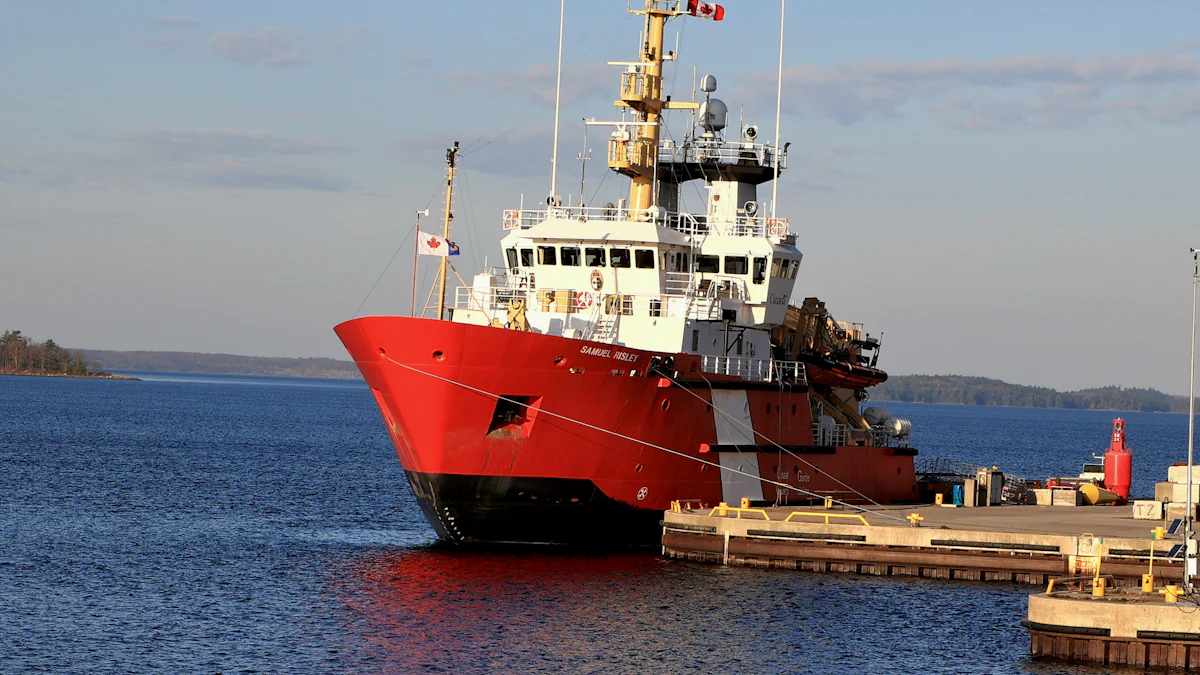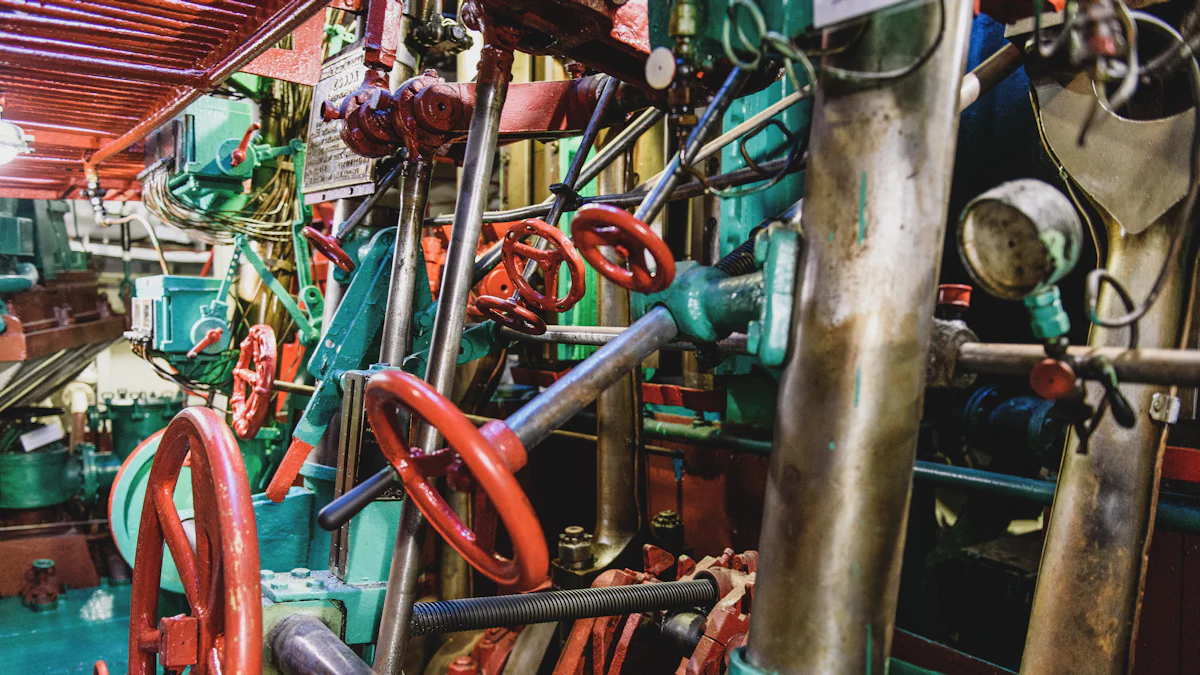Essential Advice for Aspiring Marine Engineers

Marine engineering offers a world of opportunities for those passionate about innovation and the maritime industry. This field plays a vital role in designing, constructing, and maintaining ships, submarines, and offshore structures. With employment projected to grow by 8% from 2023 to 2033, the demand for skilled professionals continues to rise. Success in this dynamic career requires a strategic focus on education, technical expertise, and professional growth. As technology advances and regulations evolve, your ability to adapt and learn will define your journey in this ever-changing industry.
Key Takeaways
Pursue a specialized degree in marine engineering or related fields to build a strong foundation for your career.
Gain practical experience through internships and apprenticeships to bridge the gap between theory and real-world application.
Obtain relevant certifications, such as the U.S. Coast Guard License, to enhance your credibility and employability in the marine engineering field.
Join professional organizations like SNAME or IMarEST to expand your network and stay updated on industry trends.
Embrace lifelong learning by attending workshops and pursuing advanced degrees to keep pace with technological advancements.
Consider specializing in emerging areas like green technologies or marine robotics to position yourself as an expert in a niche market.
Build a comprehensive portfolio showcasing your projects and skills to stand out to potential employers.
Understanding the Role of a Marine Engineer

Responsibilities and Daily Tasks
As a marine engineer, you take on the critical task of ensuring the smooth operation of ships and offshore structures. Your day often begins with inspecting mechanical systems, such as engines, pumps, and turbines, to confirm they function efficiently. When issues arise, you troubleshoot and repair machinery, even in remote locations where resources may be limited. This role demands precision and quick thinking, as the safety and performance of vessels depend on your expertise.
You also collaborate with international teams to manage complex projects. Whether you're coordinating maintenance schedules or supervising the installation of new equipment, teamwork plays a vital role in your success. Beyond technical tasks, you may handle administrative duties, such as maintaining detailed logs and reports. These records ensure compliance with maritime regulations and help improve operational efficiency.
"A marine engineer’s day on board a ship involves managing a range of mechanical systems and machinery. From troubleshooting machinery in remote locations to collaborating with international teams, marine engineering provides a diverse and stimulating career."
This quote highlights the dynamic nature of your responsibilities. Each day presents new challenges, keeping your work engaging and rewarding.
Key Skills for Success in Marine Engineering
To excel in marine engineering, you need a combination of technical and soft skills. Proficiency in mechanical systems, electrical circuits, and computer-aided design (CAD) software forms the foundation of your technical expertise. These skills enable you to design, analyze, and maintain complex systems effectively.
Equally important are your problem-solving abilities. When machinery malfunctions, you must diagnose the issue quickly and implement solutions under pressure. Strong analytical thinking helps you make informed decisions that minimize downtime and ensure safety.
Soft skills, such as communication and leadership, are essential for working with diverse teams. You must convey technical information clearly to colleagues and stakeholders. Leadership skills allow you to manage teams and oversee projects with confidence. By mastering these skills, you position yourself as a valuable asset in the field of marine engineering.
Career Paths and Opportunities in Marine Engineering
Marine engineering offers a variety of career paths, allowing you to specialize based on your interests. You might choose to work on commercial ships, designing and maintaining propulsion systems. Alternatively, you could focus on offshore platforms, where you oversee the operation of drilling equipment and support systems.
If innovation excites you, consider a career in research and development. Here, you contribute to advancements in marine technology, such as eco-friendly propulsion systems or autonomous vessels. Leadership roles, such as chief engineer or project manager, provide opportunities to guide teams and manage large-scale operations.
The demand for skilled marine engineers continues to grow, driven by advancements in technology and the global shipping industry's expansion. This growth ensures a steady stream of opportunities for professionals like you. By exploring different career paths, you can find a role that aligns with your skills and aspirations.
Educational Pathways and Certifications
Choosing the Right Marine Engineering Degree
Selecting the right degree program lays the foundation for your career in marine engineering. Most professionals in this field pursue a bachelor’s degree in marine engineering, naval architecture, or a related discipline. Programs like those offered at state maritime academies provide specialized training that prepares you for the challenges of this industry. These institutions often combine classroom learning with hands-on experiences, ensuring you develop both theoretical knowledge and practical skills.
If you prefer a broader approach, degrees in ocean engineering, electrical engineering, or mechanical engineering can also lead to a career in marine engineering. However, focusing on a program specifically designed for marine engineering gives you an edge. For example, the Maine Maritime Academy offers an undergraduate program ranked among the best in the nation. Students gain real-world experience aboard the 500-foot training ship, State of Maine, during their first year. This type of immersive learning ensures you are job-ready upon graduation.
When choosing a school, consider factors like accreditation, faculty expertise, and access to internships. These elements significantly impact the quality of education you receive and your readiness for the workforce.
Essential Certifications and Licenses
Certifications and licenses validate your expertise and enhance your credibility as a marine engineer. After earning your degree, obtaining the necessary certifications becomes your next step. The most recognized credential in this field is the U.S. Coast Guard License, which qualifies you to work on ships and offshore platforms. To earn this license, you must pass rigorous exams that test your technical knowledge and problem-solving abilities.
In addition to the Coast Guard License, certifications in areas like welding, CAD software, or marine safety can boost your employability. These credentials demonstrate your proficiency in specialized skills that employers value. For leadership roles, consider pursuing a Professional Engineer (PE) license. This certification signifies your ability to oversee projects and manage teams effectively.
Staying updated on industry requirements ensures you maintain compliance and remain competitive in the job market. Regularly review the certifications relevant to your career goals and invest in continuous learning.
The Role of Accreditation in Career Success
Accreditation plays a crucial role in shaping your career as a marine engineer. Accredited programs meet high standards of quality, ensuring you receive an education that aligns with industry needs. Employers often prioritize candidates who graduate from accredited institutions because they trust the rigor and relevance of these programs.
For example, programs accredited by the Accreditation Board for Engineering and Technology (ABET) are highly regarded in the engineering community. These programs emphasize both technical and soft skills, preparing you for the multifaceted demands of marine engineering. Accreditation also simplifies the process of obtaining certifications and licenses, as many credentialing bodies require proof of graduation from an accredited program.
When researching schools, verify their accreditation status. This step ensures your degree holds value and opens doors to diverse career opportunities. By prioritizing accredited programs, you set yourself up for long-term success in the competitive field of marine engineering.
Gaining Practical Experience

Importance of Internships and Apprenticeships
Internships and apprenticeships provide you with invaluable hands-on experience in marine engineering. These opportunities bridge the gap between theoretical knowledge and real-world application. By working alongside seasoned professionals, you gain insights into the daily operations of the industry. You also develop a deeper understanding of how to troubleshoot mechanical systems, maintain equipment, and ensure compliance with maritime regulations.
Internships often expose you to diverse projects, from ship maintenance to offshore platform operations. This variety helps you identify your strengths and interests within the field. Apprenticeships, on the other hand, offer structured training programs that focus on skill development. These programs allow you to learn directly from experts while earning a stipend.
"Handling real-world scenarios during internships prepares you for the challenges of marine engineering. It builds confidence and equips you with practical skills that employers value."
Seek internships or apprenticeships with reputable organizations. Companies operating in regions like the Huizhou Zhongkai High-tech Zone often provide cutting-edge training environments. These experiences not only enhance your technical abilities but also strengthen your resume, making you a competitive candidate in the job market.
On-the-Job Training for Skill Development
On-the-job training plays a crucial role in refining your technical expertise. As you work in real-world settings, you encounter challenges that require quick thinking and problem-solving. This type of training allows you to apply classroom knowledge to practical situations, solidifying your understanding of marine systems.
Employers often use structured programs to help you master specific skills. For example, you might learn to operate advanced machinery, interpret technical drawings, or manage safety protocols. These experiences build your confidence and prepare you for leadership roles in the future.
To maximize the benefits of on-the-job training, approach each task with curiosity and determination. Ask questions, seek feedback, and take initiative. Your willingness to learn demonstrates your commitment to professional growth. Over time, these efforts will position you as a valuable asset to your team.
Building a Portfolio to Showcase Expertise
A well-crafted portfolio showcases your expertise and sets you apart from other candidates. This collection of work highlights your achievements, skills, and experiences in marine engineering. It serves as a visual representation of your capabilities, making it easier for employers to assess your qualifications.
Include detailed descriptions of projects you have completed during internships, apprenticeships, or on-the-job training. For instance, if you contributed to the design of a propulsion system or led a maintenance operation, document these accomplishments. Use photographs, diagrams, or CAD models to illustrate your work.
Organize your portfolio into sections that reflect your areas of expertise. For example:
Mechanical Systems: Projects involving engines, turbines, or pumps.
Electrical Systems: Work related to circuits, wiring, or automation.
Safety and Compliance: Initiatives that improved operational efficiency or ensured regulatory adherence.
"A strong portfolio demonstrates your ability to handle complex tasks and adapt to industry demands. It provides tangible proof of your skills and dedication."
Regularly update your portfolio to include new achievements. Share it during interviews or networking events to leave a lasting impression. A comprehensive portfolio not only enhances your credibility but also opens doors to exciting career opportunities in marine engineering.
Networking and Professional Development
Building a strong professional network is essential for advancing your career in marine engineering. Networking connects you with industry leaders, peers, and mentors who can provide valuable insights and opportunities. By actively engaging in professional development activities, you position yourself for long-term success in this dynamic field.
Joining Marine Engineering Organizations
Joining professional organizations dedicated to marine engineering enhances your career prospects. Groups like the Society of Naval Architects and Marine Engineers (SNAME) and the Institute of Marine Engineering, Science and Technology (IMarEST) offer numerous benefits. Membership provides access to industry news, technical resources, and educational programs tailored to your field. These organizations also demonstrate your commitment to professional growth, which adds credibility to your profile.
Membership in these societies connects you with a global network of marine engineers and technologists. You can participate in forums, webinars, and workshops that address the latest advancements in marine engineering. These platforms allow you to exchange ideas, learn from experts, and stay updated on industry trends. By joining such organizations, you not only expand your knowledge but also strengthen your professional reputation.
"Being part of professional organizations like SNAME or IMarEST shows your dedication to staying connected and informed in the marine engineering community."
Take the initiative to explore membership opportunities. Many organizations offer student memberships, making it easier to start building your network early in your career.
Attending Industry Events and Conferences
Industry events and conferences provide excellent opportunities to connect with professionals and gain insights into the latest developments in marine engineering. These gatherings often feature keynote speakers, panel discussions, and technical sessions led by industry experts. Attending these events helps you stay informed about emerging technologies, regulatory changes, and best practices.
Conferences also serve as a platform for showcasing your expertise. You can present research, share innovative ideas, or participate in discussions that highlight your skills and knowledge. Engaging with attendees allows you to build relationships with potential employers, collaborators, and mentors.
For example, events hosted by organizations like SNAME or IMarEST often attract leaders in the maritime industry. These events provide a unique opportunity to interact with professionals who can guide your career. By actively participating, you demonstrate your enthusiasm and commitment to the field.
"Attending industry events keeps you relevant and connected in the fast-evolving world of marine engineering."
Plan to attend at least one major conference annually. Prepare by researching the event agenda, identifying key speakers, and setting networking goals.
Using Online Platforms for Networking and Mentorship
Online platforms have revolutionized the way professionals connect and collaborate. Websites like LinkedIn and specialized forums for marine engineering offer a convenient way to expand your network. By creating a strong online presence, you can showcase your skills, share achievements, and engage with industry professionals.
Use these platforms to join discussions, ask questions, and seek advice from experienced engineers. Many professionals are willing to mentor aspiring engineers, providing guidance on career decisions, technical challenges, and skill development. Engaging with these mentors can accelerate your growth and help you navigate the complexities of the industry.
Additionally, online platforms often feature job postings, webinars, and virtual events tailored to marine engineering. Participating in these activities keeps you informed and connected, even when in-person events are not an option.
"Leveraging online platforms for networking and mentorship opens doors to opportunities that might otherwise remain out of reach."
Dedicate time each week to maintaining your online presence. Share relevant content, comment on posts, and connect with professionals who inspire you. A proactive approach ensures you remain visible and engaged in the marine engineering community.
Specialization and Advanced Education
Exploring Specialization Areas in Marine Engineering
Specializing in a specific area of marine engineering can significantly enhance your career prospects. By focusing on a niche, you position yourself as an expert in that domain, making you more valuable to employers. Marine engineering offers various specialization areas, each catering to different interests and skills.
You might choose to specialize in propulsion systems, where you design and optimize engines for ships and submarines. Alternatively, you could focus on offshore engineering, which involves constructing and maintaining oil rigs, wind farms, and other offshore structures. If sustainability interests you, consider specializing in green marine technologies. This field focuses on developing eco-friendly solutions, such as energy-efficient propulsion systems and alternative fuels.
Other specialization areas include:
Hydrodynamics: Studying the movement of water around vessels to improve efficiency.
Marine robotics: Designing autonomous underwater vehicles (AUVs) for exploration and research.
Structural engineering: Ensuring the integrity and safety of ship hulls and offshore platforms.
"Specializing in a particular area of marine engineering provides a substantial career advantage." – American Profession Guide
By selecting a specialization that aligns with your passion and strengths, you can carve out a unique career path and stay ahead in this competitive field.
Pursuing Advanced Degrees and Certifications
Earning an advanced degree in marine engineering or a related field can open doors to leadership roles and innovative projects. A master’s degree allows you to deepen your knowledge and gain expertise in cutting-edge technologies. Many universities offer programs that focus on advanced topics, such as computational fluid dynamics, marine renewable energy, and autonomous vessel design.
Pursuing certifications further validates your skills and enhances your credibility. For instance, obtaining a Professional Engineer (PE) license demonstrates your ability to manage complex projects and lead teams. Specialized certifications, such as those in marine safety or advanced CAD software, can also boost your employability.
Consider these steps to advance your education and credentials:
Research graduate programs: Look for universities with strong marine engineering departments and industry connections.
Enroll in workshops or short courses: These provide targeted training in areas like emerging technologies or regulatory compliance.
Stay updated on certification requirements: Regularly review industry standards to ensure your qualifications remain relevant.
"Pursuing advanced degrees in marine engineering provides substantial benefits." – American Profession Guide
Investing in advanced education and certifications not only strengthens your expertise but also prepares you for the evolving demands of the maritime industry.
Developing Expertise in Emerging Marine Technologies
The marine engineering field constantly evolves with advancements in technology. Staying current with these innovations is essential for career growth. Emerging technologies, such as autonomous vessels, artificial intelligence (AI), and renewable energy systems, are transforming the industry.
You can develop expertise in these areas by enrolling in specialized courses or attending industry workshops. For example, learning about AI applications in navigation systems or exploring the design of hybrid propulsion systems can set you apart from your peers. Many organizations in regions like the Huizhou Zhongkai High-tech Zone offer training programs that focus on cutting-edge technologies.
Key areas to explore include:
Autonomous vessels: Understanding the integration of AI and machine learning in ship operations.
Renewable energy systems: Designing and implementing solar, wind, or wave energy solutions for marine applications.
Digital twins: Using virtual models to simulate and optimize vessel performance.
"Advanced technology enhances every aspect of marine engineering. Staying current with technological advancements is essential for marine engineers." – American Profession Guide
By embracing these innovations, you not only future-proof your career but also contribute to the industry's progress. Dedicate time to continuous learning and skill development to remain competitive in this dynamic field.
Staying Updated and Adapting to Industry Trends
Keeping Up with Technological Innovations
The maritime industry evolves rapidly, driven by technological advancements. As a marine engineer, staying informed about these innovations ensures you remain competitive. Emerging technologies like autonomous vessels, artificial intelligence (AI), and renewable energy systems are reshaping the field. You must actively explore these areas to enhance your expertise.
Start by following industry publications and research papers. These resources provide insights into cutting-edge developments. For example, advancements in AI-powered navigation systems improve vessel efficiency and safety. By understanding these technologies, you position yourself as a forward-thinking professional.
Participating in workshops and training programs also helps you stay ahead. Many organizations, including those in regions like Huizhou Zhongkai High-tech Zone, offer specialized courses on advanced marine technologies. These programs equip you with practical knowledge and hands-on experience.
"Marine engineers lead the transformation of the maritime industry by embracing innovation and adaptability."
Adopting a proactive approach to learning ensures you remain relevant in this dynamic field. Dedicate time to mastering new tools and techniques that align with industry trends.
Navigating Environmental and Regulatory Changes
Environmental concerns and regulatory updates significantly impact marine engineering. Governments and organizations worldwide enforce stricter regulations to reduce emissions and protect marine ecosystems. You must understand these changes to ensure compliance and contribute to sustainable practices.
Focus on learning about eco-friendly technologies. For instance, green propulsion systems and alternative fuels help reduce environmental impact. Familiarize yourself with international standards like the International Maritime Organization (IMO) regulations. These guidelines shape the design and operation of vessels.
Collaboration with industry experts enhances your understanding of regulatory requirements. Attend seminars and conferences that address environmental challenges. These events provide valuable insights into best practices and innovative solutions.
"Marine engineers adapting to ever-changing demands of the industry achieve significant milestones in their careers."
By prioritizing sustainability and compliance, you not only meet industry expectations but also contribute to a greener future.
Embracing Lifelong Learning and Professional Growth
Continuous learning is essential for success in marine engineering. The industry demands professionals who adapt to new challenges and technologies. You must commit to lifelong education to maintain your expertise and advance your career.
Set clear goals for professional development. Enroll in advanced courses or certifications that align with your interests. For example, pursuing a master’s degree in marine engineering deepens your knowledge and opens doors to leadership roles.
Networking plays a vital role in your growth. Engage with peers and mentors through online platforms or professional organizations. These connections provide guidance and opportunities for collaboration.
"Marine engineers who embrace lifelong learning drive innovation and progress in the maritime industry."
Dedicate time to self-improvement and skill enhancement. Your commitment to growth ensures you remain a valuable asset in this ever-evolving field.
Succeeding in marine engineering requires a clear focus on education, practical experience, and professional connections. By pursuing specialized degrees, gaining hands-on training, and building a strong network, you set yourself up for a rewarding career. Take actionable steps today to enhance your skills and explore opportunities in this dynamic field.
"Handling crises, making quick decisions, and ensuring safety are the hallmarks of a skilled marine engineer."
Stay adaptable and committed to your goals. Your dedication will not only shape your career but also contribute to the advancement of the maritime industry.
See Also
Leading Innovators Shaping the Global Intelligent Control Sector
Maximizing Growth Opportunities Through High-Tech Zones
Three Key Players Dominating the Zhongkai High-Tech Zone
Zecheng Technology's Impact on Zhongkai's High-Tech Development
Zhongkai High tech Zone National foreign trade transformation and Upgradi Base(Electronic Information)Cloud Platform.
Address: Zhongkai High-tech Zone,Huizhou City ,Guangdong,China
E-mail: huizhoueii@163.com 13510001271@163.com
Tel: +86-0752-3279220 Mobile: +86-13510001271


